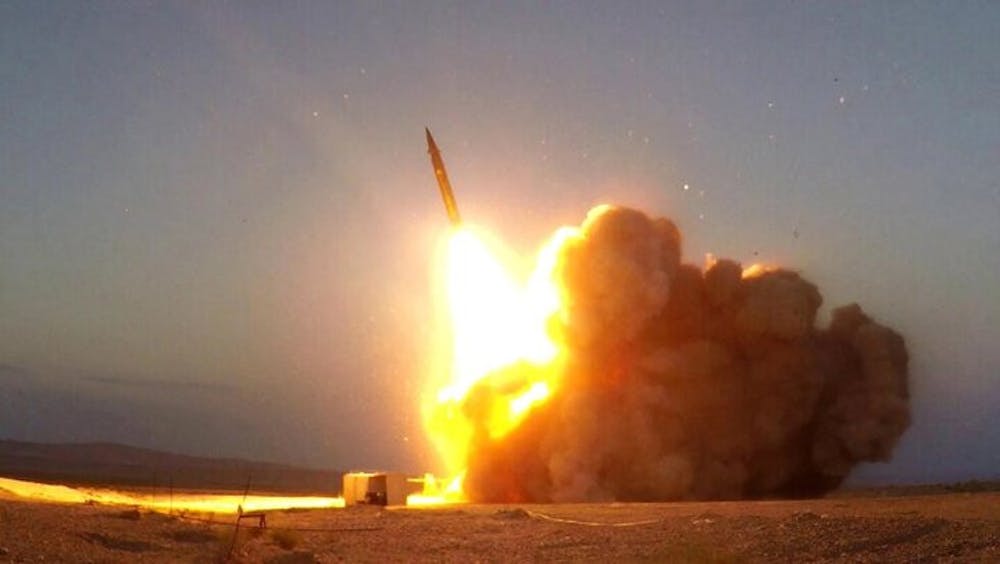By Gauri Patel
Staff Writer
Iran launched a drone and missile attack on Israel on April 13 in retaliation for the suspected Israeli strike on its consulate in Syria on April 1. The attack marked the first time Iran has launched a direct military assault on Israel amid a decades-long proxy war between the nations, according to The Associated Press.
Israeli military officials say over 300 missiles and drones were launched from Iran and its proxies, including over 30 cruise missiles, over 120 ballistic missiles and 170 drones. Most were shot down by Israel's Iron Dome defense system and with help from the United States, Britain, France and Jordan. However, minor damage was caused by several ballistic missiles that were not intercepted, according to The Associated Press. Israeli officials reported that a 7-year-old girl was seriously injured by missile fragments and eight other people were treated for minor injuries.
The Iranian attack occurred less than two weeks after the presumed Israeli attack on the Iranian consulate building in the Syrian capital Damascus, which killed 12 people, including two senior Iranian generals. Tehran said the latest strike was punishment for the Damascus attack, which it saw as a violation of its sovereignty. Israel has neither confirmed nor denied responsibility for the consulate attack.
The U.S. and Britain announced new sanctions and export controls against Iran as concern grows that the unprecedented attack on Israel could fuel a wider war in the Middle East. In a statement, U.S. President Joe Biden said the U.S. will “not hesitate” to hold Iran accountable.
“The sanctions target leaders and entities connected to the Islamic Revolutionary Guard Corps, Iran’s Defense Ministry, and the Iranian government’s missile and drone program that enabled this brazen assault,” Biden said, adding that the U.S. is committed to Israel’s security. Biden also said the leaders of the G7 group of leading world economies were committed to collectively increasing economic pressure on Iran.
According to Reuters, the measures will target 16 individuals and two entities linked to the production of Iranian unmanned aerial vehicles, or drones, including models that were used in the attack against Israel. Washington also sanctioned five companies that provide materials for steel production in Iran, as well as three subsidiaries of an Iranian automaker accused of materially supporting Iran’s Islamic Revolutionary Guard Corps.
The U.S. sanctions on Thursday came in coordination with the United Kingdom, which also imposed sanctions on people and entities involved in Iran’s UAV and ballistic missile industries. In a statement, the government of the U.K. said it sanctioned “7 individuals and 6 entities who have enabled Iran to conduct destabilising regional activity,” including officials of Iran’s Armed Forces and individuals affiliated with Iran’s Aerospace Industries Organisation, among others.
“Today we have sanctioned the ringleaders of the Iranian military and forces responsible for the weekend’s attack,” said U.K. Prime Minister Rishi Sunak, according to the statement. “These sanctions – announced with the US – show we unequivocally condemn this behaviour, and they will further limit Iran’s ability to destabilise the region.”
Despite an international push for de-escalation, Israeli leaders, including Prime Minister Benjamin Netanyahu, have pledged to respond to the attack. According to Reuters, Israel has supposedly launched drones near a major Iranian airbase in Iran, six days after the Iranian attack. Explosions were reported in the province of Isfahan after defense forces intercepted three drones, though there were no reported damages or casualties. Israel has not commented on the attack nor claimed responsibility. Tehran has had a muted response to the attack, with a senior Iranian official telling Reuters that Iran does not have plans to respond to the incident, potentially signaling the two nations’ effort to prevent a region-wide war.
World leaders including the Secretary General of the United Nations have repeatedly called on Israel and Iran to de-escalate tensions, according to The New York Times, Netanyahu said Israel will make its “own decisions” when responding to Iran’s airstrikes.







